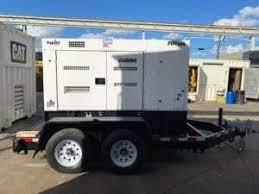Generators use the scientific concept of electromagnetic induction to transform mechanical energy into electrical energy. The engine powers an alternator that consists of stationary and moving parts to cause electrons to move.
Surplus Record
Purchasing used equipment is an excellent way to save money on the purchase of power generation equipment. This method reduces depreciation and can allow for the immediate application of funds to other projects or operations. Used generators can be purchased from auctions, heavy machinery distributions and through generator dealers. It is important to choose a quality product that meets your facility or company’s needs. For example, a small facility should purchase a smaller generator that is quieter.
When comparing generators, consider how many hours the engine has been used. Much like a car’s odometer, generator engines are equipped with hour meters that record usage time. The lower the number of hours, the less the generator has been used. buy used generators from the best seller surplusrecord.
A good lubrication system is also critical for a generator. There are many small moving parts within a generator that must be properly lubricated to avoid excess wear and tear. It is important to check and change the lubricant regularly. A generator should have a cooling and exhaust system that removes the fumes that it creates during operation. These systems are necessary for the safety of employees and visitors in a facility. They also help keep the generator from overheating. The exhaust system should direct the fumes away from the facility and into a sealed area that is far from doors, windows and other areas of air intake.
Used Gensets facilities
For manufacturing facilities that are heavily reliant on their electronic appliances for production, a generator is essential. Its ability to keep productivity up and running despite power failures or systemic errors is remarkable. It also provides backup for hospitals that may need to power life-saving equipment in the event of a blackout.
Whether it’s a genset that runs on natural gas or diesel fuel, these machines provide an emergency power source for the most critical locations and businesses. Data centers, for example, use gensets to prevent their servers from going down, which can cost them significant amounts of money and even the security of sensitive information. Hospitals rely on these devices to continue working on critical machinery to treat patients in the event of an area power outage or storm. They are also essential in keeping the supply of medicines and other medical supplies running during a power outage or disaster.
In addition to their main engine, industrial generators are designed with other key parts like the battery, lubrication system, and control panel. The battery and lubrication systems are essential for providing the proper ointment to the many moving parts within the machine. The control panel acts as the brain of the generator, ensuring that the machine is operating correctly and safely.
Diesel Gensets Backup Power
Many industries require back-up power to ensure continued operation. For example, warehouses need large generators to keep their heavy equipment working without interruption. This equipment is used to build products and ship them to customers, so any interruption in power could cause costly losses for the company.
Diesel gensets, or “gen sets” as they are sometimes known, are designed to provide continuous power when utility electricity is interrupted. They work by using a diesel engine to generate electricity through alternators. The engine converts the chemical energy from the fuel to mechanical energy, which spins the alternator rotor, creating electrical current through electromagnetic induction between the rotor and stator. These gensets are often fueled by propane or diesel fuel. Depending on the application, they may also be powered by natural gas or gasoline. Many modern diesel gensets use glow plugs or other heating components to warm up the engine and prevent carbon monoxide poisoning in case of a cold start.
Used Generators Importance
Many large and small businesses routinely use generators as backup power for their operations. It’s important to remember that the most important factor when buying a used industrial generator is a dealer’s reputation and technical expertise. Dealers who inspect, tune up, rebuild, test, and repair generators before reselling them are much more likely to provide quality equipment.
An industrial generator’s job is to force electrical charges through its wiring and inevitably to whatever resource needs power. Its most important components include the engine, alternator, and fuel system. The engine inputs the mechanical energy to run its many parts, including the generator’s rotor and plastic housing. The alternator then facilitates the flow of electrical current through the generator. The fuel system stores and converts the inclusion of fuel into mechanical energy to keep the entire machine running. Industrial generators are highly useful for industries that require constant power, such as mining and construction. These generators are also vital for hospitals and other medical facilities, where a power outage could have serious consequences. Many of these machines are designed and produced according to strict legal and production norms, so they’re reliable and durable. These generators can even be used as a primary power source in areas with limited access to the electricity grid. These generators usually release toxic fumes, so they need to be kept in a purpose-built space or outside to prevent carbon monoxide poisoning.
